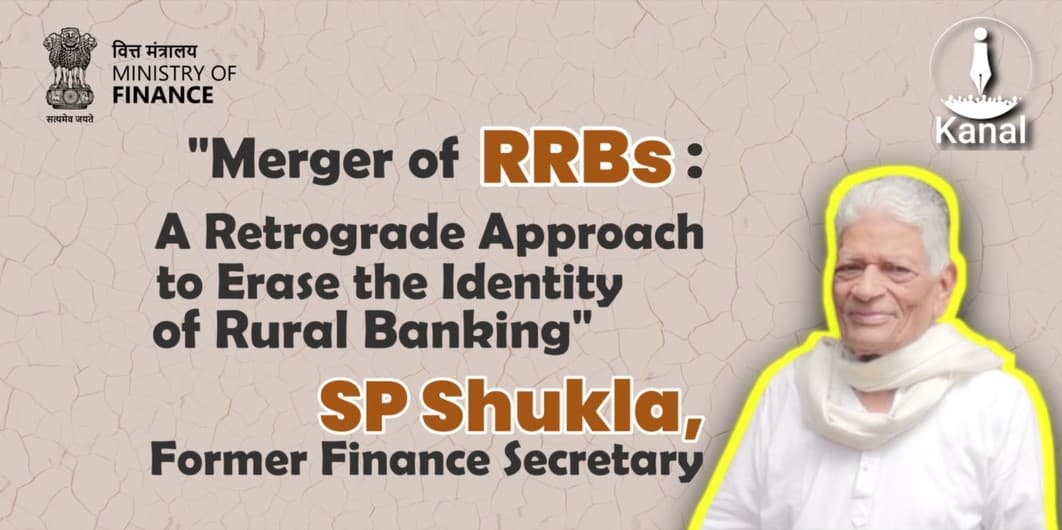“Merger of RRBs with Sponsor Banks: A Retrograde Approach Threatening the Identity of Rural Banking” : S P Shukla, Former Finance Secretary
The merger of Regional Rural Banks (RRBs) with sponsor banks has ignited widespread debate, with industry experts like former Finance Secretary S.P. Shukla and economist Prof. C.P. Chandrasekhar voicing strong opposition. They argue that such consolidation undermines the unique identity of RRBs, essential for financial inclusion in rural India. As the Independent Commission on Banking and Finance highlights, merging RRBs would shift focus from social banking to profit-driven models, threatening the rural economy’s lifeline.

Author: Saurav Kumar
Published: August 20, 2024
Amidst the ongoing speculations and debate surrounding the merger of Regional Rural Banks (RRBs), S.P. Shukla, India's former finance secretary and former member of the Planning Commission, has strongly advocated for the continuation and distinct identity of RRBs.
Advertisement
S.P. Shukla, who led the Independent Commission on Banking and Finance, established at the initiative of the All India Bank Officers' Confederation (AIBOC), released a report in 2006 focused on RRBs. This report highlighted their comprehensive functionality while also addressing the perspectives of various committees that examined the ownership and operations of these banks.
Image: Cover of Independent Commission on Banking and Financial Policy Report
Advertisement
Merging RRBs with Sponsor Bank: A Retrograde Approach
The Independent Commission's report thoroughly examines the status of Regional Rural Banks (RRBs) since their inception, highlighting their operations amid ongoing challenges such as unsatisfactory recovery rates, low cash-deposit ratios, and increasing credit advances towards non-priority sectors.
Advertisement
In an exclusive conversation with Kanal, S.P. Shukla emphasised the critical need for a strong network of RRBs and cooperative banks to sustain rural India's financial landscape. He remarked, “RRBs must exist to serve rural India in the best possible manner, as commercial banking is not suited for rural agricultural finance. Furthermore, merging RRBs with their sponsor banks is a retrograde approach that threatens to erase the unique identity of rural banking.”
He also noted, “The entire concept of merging RRBs into commercial banks is troubling, as it disregards the distinct approach and techniques that were fundamental to the creation of gramin banks.”
According to Shukla, “India’s rural areas urgently require efforts to halt the de-ruralisation of rural India and it can be done only by strengthening RRBs aiming improving financial health, intensifying priority sector lending, and fostering the growth of rural society and the economy.”
There’s No Substitute to RRBs
According to the Independent Commission report, RRBs were established in India's unbanked and underbanked regions to expand financial inclusion. Economist and Independent Commission on Banking and Finance member, Prof. C.P. Chandrasekhar, emphasised that RRBs are irreplaceable in their role of serving rural India.
Discussing the merger of RRBs, Prof. Chandrasekhar told Kanal, “The merger of RRBs essentially consolidates them into the commercial banking system, reducing their reach through cost-cutting and shifting away from priority sector banking that benefits the rural population.”
He further added, “This merger also signifies a move away from social banking towards a profitability-focused approach, which could adversely affect the timely and targeted distribution of credit to rural areas.”
The Question of Ownership
The report further emphasised the necessity for RRBs to maintain their separate identity and endorsed functional autonomy amid ongoing debates on their merger.
The committee categorically endorsed RRBs autonomy and said, “In our view, it is necessary that along with the Vyas Committee recommendations, which has astutely defined the post-merger banking structure in terms of state-level banks, the policymakers also take into consideration the legitimate demand for functional autonomy and to rid the RRBs of the ‘sole’ commercial orientation such that the present decline of rural banking might be reversed.”
On one side, the All India Regional Rural Bank Officers Federation (AIRRBOF), representing officers in RRBs, supports the merger with sponsor banks, citing potential benefits like enhanced manpower and infrastructure. Conversely, the All India Regional Rural Bank Employees Association (AIRRBEA) advocates for de-linking RRBs from sponsor banks to ensure their autonomy.
Image: Excerpt from the Independent Commission document on the merger of RRBs.
The debate surrounding the merger of RRBs has sparked arguments both for and against the move. However, the Independent Commission's report presents a strong case in favour of preserving RRBs as autonomous entities.
No comments yet.
